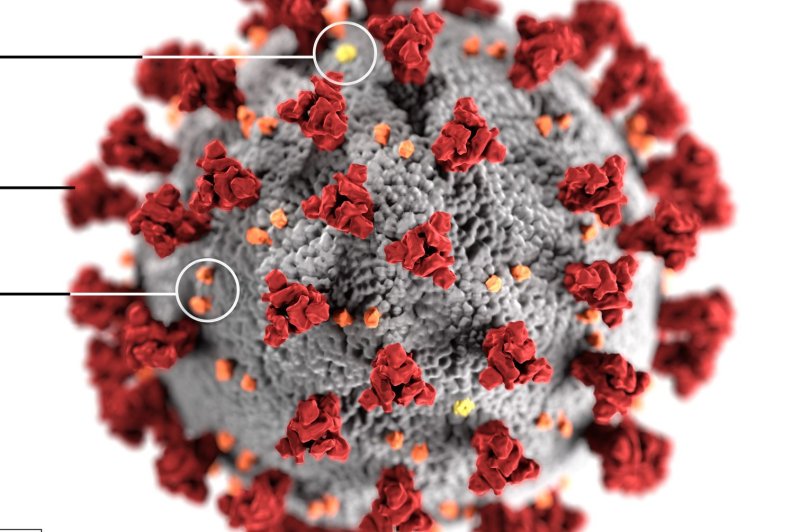A new study suggests less than 4% of the population may have antibodies against COVID-19. CDC/UPI |
License Photo
Oct. 23 (UPI) -- Fewer than 4% of adults in Wuhan, China, tested positive for antibodies against COVID-19, putting the possibility of countries developing "herd immunity" against the virus without a vaccine in doubt, according to an analysis published Friday by JAMA Network Open.
The findings also suggest that those who experience mild disease or who have no outward symptoms of the virus may not develop long-lasting immunity to it naturally, the researchers said.
The term herd immunity refers to a scenario in which most of a population has become immune to a virus and these people effectively provide indirect protection to those who are not, according to researchers at Johns Hopkins University.
One member of President Donald Trump's White House Coronavirus Task Force, Dr. Scott Atlas, has suggested the country open back up and look to achieve herd immunity, though he did so before joining the task force in August.
"Even if all of these people had the perfect antibodies that conferred immunity to this virus for some unknown amount of time, the prevalence found in this study and others is never rising to the level of herd immunity," Henry Raymond, an associate professor of biostatistics and epidemiology at Rutgers University, told UPI.
The idea of herd immunity to COVID-19 occurring naturally in the absence of a vaccine is "wishful thinking at this point," said Raymond, who was not part of the Wuhan study.
Although some studies have suggested that people infected with COVID-19 develop antibodies -- proteins produced by the immune system that help fight off disease -- against it that last several months, there have also been cases of reinfection, where someone who has recovered gets sick again with a different strain of the virus.
As a result, questions remain about whether it's possible for those who have the virus to develop an immune response against it naturally.
Two main types of COVID-19 antibodies, immunoglobulin M and G, are found in the blood of those who have had the disease, scientists have said.
For this study, researchers at Tongji Hospital of Huazhong University of Science and Technology in Wuhan tested 35,040 adults for COVID-19 antibodies between March 26 and May 24.
None of the study participants tested positive for the antibody immunoglobulin M alone, while 3.2% had evidence of immunoglobulin G, the researchers said.
Fewer than 1% had both antibodies in their blood, the data showed.
Although 3.9% of all respondents had one or both antibodies, the prevalence of antibodies was higher, at 4.4%, among those who live in urban areas compared with those who live in suburban or rural regions, at 2.9%, the research showed.
More women, at 4.4%, had antibodies against the virus than men, at 3.3%, the researchers said.
The prevalence of antibodies found in this study suggests that more people actually may be infected with COVID-19 than what is reported in the case figures, which document those who test positive for the virus after experiencing symptoms, Raymond said.
During the height of the outbreak in Wuhan -- where COVID-19 originated, and a city of 11 million -- had about 80,000 confirmed cases of the virus, according to reports from China.
If 4% of the city's population had antibodies to the virus in March, April and May, when the outbreak there had begun to slow down, "that's substantial," Raymond said.
He noted, however, that as an epidemiologist, he is hesitant to generalize findings from 35,000 people to apply to an entire population.
"What this study shows us is that we need to continue testing people in large numbers -- both those with symptoms and without -- so we can identify all people with active virus, because even people who don't have symptoms may be shedding virus," meaning they're still contagious, he said.















